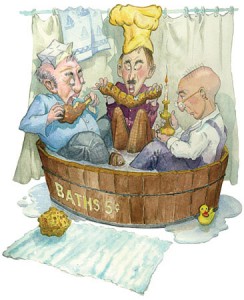Cén post atá agat? (How to say what your job is in Irish) Posted by róislín on Aug 14, 2014 in Irish Language
(le Róislín)

Cad iad na poist atá ag an triúr fear seo? Na téarmaí i nGaeilge? (http://pdsh.wikia.com/wiki/File:Rub-a-dub.jpg, public domain super heroes)
From “agraimeitéareolaí” to “zó-eolaí” (míoleolaí), we recently looked at a lot of “-ologist” occupations (Naisc thíos).
But there are many other occupational terms in Irish that don’t have the “-eolaí” ending, which, after all, implies some kind of a scientist. Some of the other typical endings include:
“-óir” and its slender variant “-eoir,” (stiúrthóir, múinteoir),
“-aire” (iascaire), and
”-éir” (búistéir), which is undergoing change in Conamara Irish to become “búistéara,” for the common form, at least for some speakers.
Other occupations may have no discernible ending as such, especially with shorter words, such as “file” [FILL-uh], “oide” [IDJ-uh}, and “údar.”
So we’ll look at those and add a few more. Maybe your job is among them. If so, please let us know. We can practice sentences like “Is dochtúir mé” or “Is múinteoir mé.” If you write in, letting us know your job, we can work up a few phrases and sentences that could go with it, like “Is dochtúir mé. Bím ag obair in ospidéal agus amanna i gclinic. Bainim úsáid as steiteascóp agus lansa, i measc uirlisí eile.”
You might remember some of these from some blogs from April 2010 (naisc thíos), which also dealt with “jabanna,” “poist,” agus “slite beatha.”
So let’s look at some examples with the structure, “I am a _______.” Can you translate these? Freagraí thíos:
1) Is múinteoir mé.
2) Is stiúrthóir mé.
3) Is aisteoir mé.
4) Is iascaire mé.
5) Is gruagaire mé.
6) Is grúdaire mé
7) Is grósaeir glasraí mé (nó: Is siopadóir glasraí mé)
8) Is búistéir mé.
9) Is file mé.
10) Is oide mé
11) Is údar mé.
12) Is altra mé. (another occupation with no distinct suffix, although the whole word used to be the ending of “banaltra,” another term for the same occupation. “Banaltra” is now considered dated because it appears to limit the profession to woman, with the prefixed element, “ban-,” which is based on “bean” (woman).
13) And one more for good measure, with the hint that by giving thirteen examples instead of an even dozen, we’re invoking this occupation: Is báicéir mé.
An bhfaca tú do phost i measc na dtéarmaí sin? Hope so, but if not, why not write it in? SGF – Róislín
Freagraí:
1) Is múinteoir mé. I’m a teacher.
2) Is stiúrthóir mé. … director. OK, maybe we don’t ordinarily just say, “I’m a director,” but we’re just trying to practice the basics here. Actually, I do seem to remember a Newfoundland version of “Casey Taking the Census” in which the husband’s job is simply “director.” When asked for more detail, what does he direct, the answer is simply “envelopes.” I’ll have to see if I can track down that reference, or perhaps a reader knows it?
3) Is aisteoir mé. … actor
4) Is iascaire mé. … fisherman (or, these days, just “fisher”)
5) Is gruagaire mé. … hairdresser
6) Is grúdaire mé. … brewer
7) Is grósaeir glasraí mé (nó: Is siopadóir glasraí mé). … greengrocer
8) Is búistéir mé. … butcher
9) Is file mé. … poet
10) Is oide mé. … tutor. Can also mean “teacher,” although that is usually “múinteoir,” and historically meant “foster-father,” in the aristocratic system of fosterage. Today’s concept of a “foster-father” is “athair altrama.”
11) Is údar mé. … author
12) Is altra mé. … nurse.
13) Is báicéir mé. … baker
With “butcher” and “baker” in tow, I now feel I should add one more. Cén post é seo:
déantóir coinnleoirí
NB: it’s not quite the same as a “coinnealóir,” although they are related.
Naisc:
Cineálacha eolaithe (síceolaí agus bitheolaí, mar shampla … agus mar nuafhocal–*Pottereolaí) Posted on 31. Jul, 2014 by róislín in Irish Language
Eolaithe Eile (agus Eolaíochtaí Eile) Posted on 05. Aug, 2014 by róislín in Irish Language
Poist: Ó ‘A’ go ‘V,’ Cuid a hAon: ‘A’ go ‘I’ Posted on 27. Apr, 2010 by róislín in Irish Language
Poist: Ó “A” go “V,” Cuid a Dó: “J” go “V” Posted on 28. Apr, 2010 by róislín in Irish Language

Build vocabulary, practice pronunciation, and more with Transparent Language Online. Available anytime, anywhere, on any device.




Leave a comment: